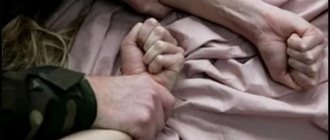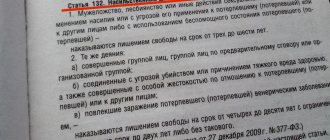Laws are a source of law or a form of its expression. This thesis was developed many years ago by legal theorists. An interesting fact is that law regulates social relations of any nature. That is, going to a store, driving a car, ordering pizza by phone - these are all legal facts that give rise to legal relations. However, the above points are positive. They are found in human everyday life. At the same time, certain individuals quite often commit actions that run counter to public morality, in other words, are negative. In the scientific community, they have their own name - offenses.
In turn, actions of this nature are also divided into certain types, depending on the degree of their danger to society. Thus, offenses and crimes themselves are distinguished, which are the most harmful acts of people. Criminal law is a legal branch that regulates legal relations of the highest public danger. But in the context of this article, we will not consider the entire range of crimes, but only one of them, namely coercion to perform acts of a sexual nature. This act is regulated by norm 133 of the Criminal Code of the Russian Federation.
Concept of criminal law
Before considering Art. 133 of the Criminal Code of the Russian Federation, it is necessary to understand the features of the industry in which liability for this act is provided. Today, this is the legal sphere of a criminal law nature. An industry of this type regulates a whole system of social relations that arise in the sphere of people committing crimes, that is, acts that have the highest social danger. In addition, criminal law also provides for the existence of certain measures of influence on violators of the legislative order, the application of which is carried out in the process of bringing them to legal responsibility. Based on the presented industry, a scientific discipline and a separate structure of regulatory legal acts were created. The basis of the legal responsibility of criminal law is a special codified law, the Criminal Code. It is in it that there is an article that establishes punishment for coercion to acts of a sexual nature.
Crime History
In domestic legislation, such a socially dangerous act as compulsion to engage in acts of a sexual nature has not always existed. It was first enshrined in the Criminal Code in 1923. However, the internal structure of this crime was somewhat different. In the first half of the 20th century, only the coercion of women by men, on whom the fairer sex depended due to their official position or financially, was condemned. In other words, this norm of the Criminal Code in the 1920s had rather narrow specificity. Later, the form of the crime expanded significantly. The updated responsibility provided for punishment for coercion not only for sexual intercourse, but also for other actions aimed at satisfying passion.
It should be noted that in those days scientists very often criticized the presented norm for its ineffectiveness. The problem was the very fact of coercion. The point is that the criminal did not always take advantage of his financial or official position. Quite often, to obtain sexual satisfaction, threats, blackmail, etc. were used. In this case, one should not reject the possibility of personal dependence that arises between the stepdaughter and stepfather. In addition, not only women, but also men can be victims. In accordance with this, the legal norm has been repeatedly amended and supplemented in every possible way. But only in the Criminal Code of the Russian Federation of 1996 was a complete and most successful article introduced, which established punishment for coercion.
Article 133 of the Code of Criminal Procedure of the Russian Federation. Grounds for the emergence of the right to rehabilitation
Art. 133 Code of Criminal Procedure of the Russian Federation
1. The right to rehabilitation includes the right to compensation for property damage, elimination of the consequences of moral harm and restoration of labor, pension, housing and other rights.
Harm caused to a citizen as a result of criminal prosecution is compensated by the state in full, regardless of the guilt of the body of inquiry, the inquiry officer, the investigator, the prosecutor and the court. 2. The right to rehabilitation, including the right to compensation for harm associated with criminal prosecution, has:
1) the defendant against whom a verdict of acquittal was made;
2) a defendant whose criminal prosecution has been terminated due to the public prosecutor’s refusal to charge;
3) a suspect or accused, criminal prosecution against whom has been terminated on the grounds provided for in paragraphs 1, 2, 5 and 6 of part one of Article 24 and paragraphs 1 and 4-6 of part one of Article 27 of this Code;
4) convicted person - in cases of complete or partial cancellation of a court conviction that has entered into legal force and termination of a criminal case on the grounds provided for in paragraphs 1 and 2 of part one of Article 27 of this Code;
5) a person to whom compulsory medical measures were applied - in the event of the cancellation of an illegal or unfounded court decision on the application of this measure.
2.1. The right to rehabilitation, including the right to compensation for harm, in the manner established by this chapter, in criminal cases of private prosecution have the persons specified in paragraphs 1-4 of part two of this article, if the criminal case was initiated in accordance with part four of Article 20 of this Code, as well as those convicted in criminal cases of private prosecution initiated by the court in accordance with Article 318 of this Code, in cases of complete or partial reversal of the court’s conviction and acquittal of the convicted person or termination of the criminal case or criminal prosecution on the grounds provided for in paragraphs 1, 2 and 5 of part one of Article 24 and paragraphs 1, 4 and 5 of part one of Article 27 of this Code.
3. Any person unlawfully subjected to measures of procedural coercion during criminal proceedings also has the right to compensation for harm in the manner established by this chapter.
4. The rules of this article do not apply to cases where procedural coercive measures applied to a person or a guilty verdict have been canceled or changed due to the issuance of an amnesty act, expiration of the statute of limitations, failure to reach the age of criminal responsibility, or in relation to a minor who although he had reached the age at which criminal liability begins, but due to mental retardation not associated with a mental disorder, he could not fully understand the actual nature and social danger of his actions (inaction) and manage them at the time of committing the act provided for by criminal law law, or the adoption of a law eliminating criminality or punishability of an act, with the exception of cases of a court ruling provided for in paragraph 1 of part three of Article 125.1 of this Code.
5. In other cases, issues related to compensation for harm are resolved through civil proceedings.
Commentary on Article 133 of the Criminal Procedure Code of the Russian Federation
1. According to the Constitution of the Russian Federation (Article 53), everyone has the right to compensation by the state for damage caused by illegal actions (or inaction) of state authorities or their officials. This provision is based on the concept of a democratic rule of law state, in which, in contrast to the inhumane rule “cut the forest - the chips fly” prevailing in a totalitarian state, the interests of the individual are put at the forefront and the state itself, subject to the requirement of the rule of law, is responsible to each of its citizens for the normal operation of the entire mechanism of power and control. This provision is of particular importance in the field of criminal proceedings, where the issue of guilt in committing a crime and the use of criminal repression is decided and we are talking about the honor, freedom, property of a person - in a word, about the fate of a person. Now these issues are resolved in the Code of Criminal Procedure of the Russian Federation.
2. The concept of rehabilitation in criminal proceedings is associated with two fundamental categories - innocence and justice, i.e. with such cases when someone who has not committed a crime is subjected to criminal prosecution, being innocent, which means that he suffered all the hardships associated with criminal prosecution in vain, unfairly; retribution followed in the absence of an act. Meanwhile, in the theory and practice of criminal proceedings, a dual definition of the concept of rehabilitation has developed. Sometimes it is interpreted as the very fact that a citizen who has been subjected to criminal prosecution is found innocent; in other cases, the content of this concept also includes the legal consequences of being found innocent, namely: compensation to an innocent victim for harm caused, restoration of his former rights, return of property, titles and awards. The current Code of Criminal Procedure of the Russian Federation allows for such duality. Thus, from the content of Part 1 of the commented article, it is clear that the right to rehabilitation includes the right to compensation for property damage, and in Part 1 of Art. 135 of the Code of Criminal Procedure of the Russian Federation talks about compensation for property damage to the rehabilitated person, i.e. to someone who has already been found innocent, but has not yet received compensation from the state for his undeserved suffering.
3. The most important feature of the legal institution in question is the subject composition of legal relations that develop on its basis. Harm caused to an innocent citizen as a result of his criminal prosecution is compensated not by the official (inquirer, investigator, prosecutor, judge), in a causal connection with whose actions this harm occurred, and not by the state bodies in whose service the said officials are, but by the state , and regardless of the guilt of the officials and regardless of what level of the law enforcement system the failure occurred, where, at what stage of the criminal case the mistake was aggravated, who and to what extent was involved in this mistake or abuse, which led to the criminal prosecution of an innocent person and related with this deprivation. This legal structure has a deep philosophical, political and moral meaning. The citizen entrusts his fate in the sphere of ensuring law and order and the administration of justice not to the N department of internal affairs, the N prosecutor’s office and not to the N court, but to the state, which has the prerogative (exclusive right) of criminal prosecution. Therefore, restorative-compensatory legal relations arising from causing harm by criminal prosecution of an innocent person have a subject composition “state - citizen”.
4. According to Part 2 of the commented article, as well as the articles to which it refers, the right to rehabilitation is vested in:
a defendant against whom a verdict of acquittal was made, in other words, acquitted in court;
a defendant whose criminal prosecution has been terminated due to the refusal of the public or private prosecutor to charge;
suspect, accused, convicted, criminal prosecution against whom has been terminated:
a) in the absence of a crime;
b) for the absence of corpus delicti in the act;
c) in the absence of a statement from the victim, if a criminal case can be initiated only at his request, with the exception of cases when such a case is legally initiated (Part 4 of Article 20 of the Code of Criminal Procedure of the Russian Federation) as a public charge due to the fact that the crime committed against a person who is in a dependent state or for other reasons is unable to independently exercise his rights;
d) due to the absence of a court conclusion on the presence of signs of a crime in the actions of a person in respect of whom a special procedure for criminal proceedings has been established, or due to the lack of consent of the Federation Council, the State Duma, the Constitutional Court of the Russian Federation, the qualification board of judges to initiate a criminal case or be brought as an accused in in relation to such a person (meaning members of the Federation Council, deputies of the State Duma, judges of the Constitutional Court of the Russian Federation, judges of courts of general jurisdiction and arbitration courts, deputies of the legislative (representative) body of state power of a constituent entity of the Russian Federation, prosecutors, investigators and lawyers);
e) due to the non-involvement of the suspect or accused in the commission of a crime;
f) due to the presence in relation to the suspect or accused of a sentence on the same charge that has entered into legal force, or a court ruling or a judge’s decision to terminate the criminal case on the same charge;
g) due to the presence in relation to the suspect or accused of an unreversed decision of the inquirer, investigator or prosecutor to terminate the criminal case on the same charge or to refuse to initiate a criminal case;
h) due to the refusal of the State Duma of the Federal Assembly of the Russian Federation to give consent to the deprivation of immunity of the President of the Russian Federation, who has ceased to exercise his powers, and (or) the refusal of the Federation Council to deprive the immunity of this person. The following also have the right to rehabilitation: a convicted person - in cases of complete or partial cancellation of a court conviction that has entered into legal force and termination of a criminal case due to the non-involvement of the suspect or accused in the crime committed, due to the absence of a crime or absence of corpus delicti and some other grounds (clause p. 3 - 6, part 1, article 24 of the Code of Criminal Procedure of the Russian Federation).
The significant difference between such situations and acquittal in court is that the mistake in the form of criminal prosecution of an innocent person is discovered later, i.e. when reviewing a conviction in an appeal, cassation, supervisory procedure or due to new or newly discovered circumstances. If the conviction is overturned and the case is dismissed not completely, but partially, then restorative and compensatory legal relations associated with rehabilitation also develop only in that part of the conviction in which it was overturned; a person against whom compulsory medical measures were applied - in case of cancellation of an illegal or unfounded court order to apply this measure.
5. The above provisions on the grounds and conditions of rehabilitation are among the most controversial and confusing. They sharply contrast with theoretical views, and with the accumulated experience of using the institution of rehabilitation in the past, and with the internal meaning of rehabilitation as a legal relationship organically connected with two fundamental categories - innocence and justice. The state is a debtor only in relation to those of its citizens who suffered from criminal prosecution, being innocent of committing a crime, in other words, suffered for nothing when retribution followed in the absence of a guilty act. This circumstance is confirmed by acquittal in court or termination of the criminal case (criminal prosecution) on grounds identical to the grounds of an acquittal, which are: failure to establish the event of a crime (which is equivalent to the absence of an event), non-involvement of a person in the commission of a crime, absence of corpus delicti and a verdict of not guilty by the jury. (Part 1 of Article 302 of the Code of Criminal Procedure of the Russian Federation), refusal of the accuser to charge. All other legal grounds for termination of criminal prosecution are objectively non-rehabilitative and do not give rise to restorative and compensatory obligations of the state in relation to the person exempted from criminal liability. Neither the termination of a criminal case (for example, rape) due to the absence of a mandatory statement from the victim, nor the termination of a criminal case due to the refusal of the relevant body to consent to the criminal prosecution of a representative of a certain category of persons, nor even the termination of a criminal case that was erroneously initiated a second time about the same thing same crime, does not mean an official recognition of innocence and is not related to rehabilitation.
6. According to Part 4 of the commented article, the rule on rehabilitation does not apply to cases where procedural coercive measures applied to a person or a conviction are canceled or changed due to the expiration of the statute of limitations, the age at which criminal liability begins, or the adoption of a law eliminating crime or the punishability of the act. However, from a comparative analysis of clause 3, part 2 of the same article and clause 2, part 1 of Art. 27 of the Code of Criminal Procedure of the Russian Federation, to which she refers, it is clear that the expiration of the statute of limitations and the death of the suspect and accused also give rise to the right to rehabilitation. There is an obvious contradiction with practical consequences that are difficult to predict, although it is obvious that the categories of innocence, injustice and rehabilitation have nothing to do with it.
7. According to Part 3 of the commented article, the right to compensation for harm in the manner established by the criminal procedure law also has any person who has been unlawfully subjected to procedural coercive measures. This legal provision creates new confusion and new unanswered questions. It turns out that, on the basis of the Code of Criminal Procedure of the Russian Federation, compensation for losses can also be demanded by those whose property was damaged during a search carried out in violation of the investigative procedure, and monetary compensation, on the basis of the norms of the Code of Criminal Procedure of the Russian Federation, can be demanded by those who were humiliated during the examination, etc. etc., although these investigative actions were not at all related to the criminal prosecution of these persons, but were carried out for the purpose of collecting evidence, and the categories of innocence and rehabilitation have nothing to do with these cases. In addition, this provision obscures the meaning of what was formulated in the final part 5 of the same article. 133 of the Code of Criminal Procedure of the Russian Federation rules according to which “in other cases, issues related to compensation for harm are considered in civil proceedings,” because there are practically no such cases left.
8. It should also be noted that Part 4 of the commented article on the grounds of the right to rehabilitation is in unresolved contradiction with Part 3 of Art. 27 of the Code of Criminal Procedure of the Russian Federation on the grounds for termination of criminal prosecution (see commentary to it). Both norms deal with the following cases: a) when an act provided for by criminal law is committed by a person who has not reached the age at which criminal liability begins; b) when such an act is committed by a minor who, although he has reached the age at which criminal liability begins, but due to mental retardation, could not fully understand the actual nature and social danger of his actions (inaction) and manage them at the time of the commission of the act provided for by criminal law.
Part 3 Art. 27 of the Code of Criminal Procedure of the Russian Federation prescribes that in the presence of any of these circumstances, criminal prosecution should be terminated for lack of corpus delicti, i.e. rehabilitate the suspect or accused (trial proceedings in similar cases end in an acquittal), and Part 4 of the commented article resolutely denies such persons rehabilitation.
Article 133 of the Criminal Code of the Russian Federation with comments
The norm of the Criminal Code, provided for in Article 133, establishes punishment for coercion to acts of a sexual nature. In this case, many people have a question about what exactly can be classified as such actions. The bottom line is that a direct request to engage in sexual intercourse will not fall under the scope of this article. For criminal liability to arise, the coercion must be of a negative, illegal nature. This, in turn, is achieved through blackmail, various threats, active actions in the form of confiscation or damage to property, as well as using the victim’s dependence on the criminal. It should also be noted that inducement can be carried out to engage in sexual relations of both a natural and unnatural nature (sodomy, lesbianism, etc.). In this case, Articles 131 and 133 of the Criminal Code of the Russian Federation are the opposite. After all, with rape we are only talking about intercourse between a man and a woman. In this case, in order to understand in more detail all aspects of Art. 133 of the Criminal Code of the Russian Federation, it is necessary to consider its constituent elements. This can be done by highlighting the key elements of a socially dangerous act.
How is the minimum wage set?
The size of the minimum wage is established by Art. 1 of the Law “On Minimum Wages” dated June 19, 2000 No. 82-FZ. Every year, the Government of the Russian Federation makes decisions on updating (indexing) the minimum wage in connection with the economic situation. These decisions (formulated as laws) make changes to the value of the minimum wage specified in Art. 1 of Law No. 82-FZ.
For information on the dynamics of the minimum wage, see the material “The value of the minimum wage in 2013–2022 in Russia (table)” .
Usually the changing law is adopted in the current year for the next. For 2022, indexation was done once, and from this year the minimum wage is tied to the median salary and amounts to 13,890 rubles.
Read more about how the new minimum wage was approved here.
What payments should the employer review in connection with the increase in the minimum wage, ConsultantPlus experts told. Study the review material by getting trial access to the K+ system for free.
Read more about the impact of the minimum wage on sick leave pay in the article “Maximum amount of sick leave in 2020-2022 ” .
Art. 133 of the Criminal Code of the Russian Federation: corpus delicti
Compulsion to act of a sexual nature, like other socially dangerous acts provided for by the Criminal Code, includes several basic elements. Art. 133 of the Criminal Code of the Russian Federation is characterized by a standard composition, which includes:
- subject;
- an object;
- the subjective side;
- objective side.
Each element is endowed with many aspects that highlight the characteristics of the crime, as well as the specific features of the punishment for it.
The objective side of Article 133 of the Criminal Code of Russia
The crime presented in the article can be committed through an active action, which is compulsion to engage in sexual intercourse. That is, the person forces the victim to satisfy his sexual passion. This kind of action can be expressed in different ways. Most often, coercion takes the form of blackmail or threats of confiscation or destruction of certain property. In the first case, we are talking about the manipulation of the victim through the possibility of distributing any personal information about him.
The information in this case must be secret and unknown to a wide range of people. As for the threat of seizure of property or its destruction, such actions can also be considered a form of inducement. Threats may be of a different nature. For example, due to official dependence, the offender may threaten the victim of coercion with dismissal.
Who is the subject of Article 133. The subjective side of the crime
The person who will be held accountable for committing coercion is a person who has reached the age of 16. If the victim is financially or professionally dependent on the subject, then this fact is a special characterizing parameter. In this case, the criminal occupies a dominant position over another person, which allows him to implement the provisions of Article 133 of the Criminal Code of the Russian Federation.
The subjective side of a crime is always characterized by direct intent. That is, the person not only realizes the illegality and social danger of his actions, but also desires the consequences of their commission. Motives, as a rule, have a sexual frame, although they can be completely different.
How should the minimum wage be ensured according to the Labor Code?
Payment to employees of the minimum wage must be ensured:
- for state employees - at the expense of the corresponding budget (federal or regional);
- employees of other employers - at the expense of the employers’ own funds.
In this case, the payment of wages must comply with all the requirements of the Labor Code established for wages:
- by amount;
- place and time;
Read more about the requirements of the Labor Code regarding the procedure for paying wages in the material “Art. 136 Labor Code of the Russian Federation: questions and answers" .
- employer's obligations regarding social insurance.
NOTE! It is necessary to compare all payments due to the employee for the period in total with the minimum wage. That is, if an employee is entitled to a monthly salary and mandatory allowances (for example, under a collective agreement), then the salary itself may be less than the minimum wage, but the total amount of accruals for the month (salary + allowances) must be equal to or more than the minimum wage.
ConsultantPlus experts explained step by step how to calculate and process additional payments to your salary up to the minimum wage. To do everything correctly, get trial access to the system and switch to the ready-made solution. It's free.
Qualifying Features
When analyzing Article 133 (2) of the Criminal Code of the Russian Federation, it is possible to highlight the aggravating circumstances of the commission of a crime. In this case, there is only one qualifying aspect: the act is carried out in relation to a minor. In this case, the legislator increases the scope of criminal liability, because the object of the attack in this case is the sexual freedom of the child. Judicial practice under Art. 133 of the Criminal Code of the Russian Federation in this case is not homogeneous, despite the fact that the victim is characterized by a special level of legal protection.
Results
Art.
133 of the Labor Code regulates the establishment of the minimum wage for the population in each region. Federal legislation determines the minimum minimum wage, and regions must bring it to the subsistence level of the working population. When indexing the salaries of its employees, the employer should be guided by the norms of regional legislation, since the minimum amount of earnings of each employee who has worked the established standard of time cannot be lower than the regional minimum wage. You can find more complete information on the topic in ConsultantPlus. Free trial access to the system for 2 days.









